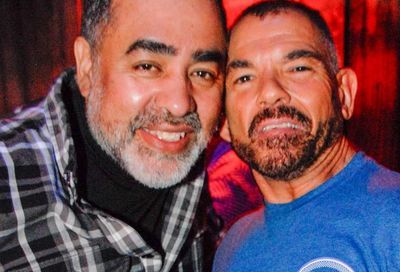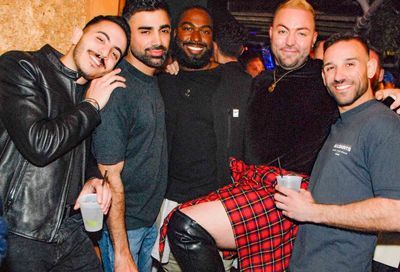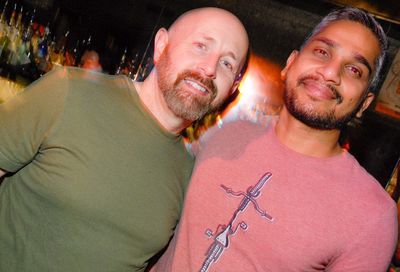Finding Common Ground
Joe Solmonese takes the helm at HRC
The first few weeks at a new job are always busy, and that’s proving particularly so for Joe Solmonese as he settles in as the new president of the Human Rights Campaign (HRC). When asked about how he spends his time during off-work hours, he laughs.
“It’s kind of hard to look much further than the next plane ticket these days,” says the 40-year-old political activist, noting that workaholism is “sort of an inevitability here,” as he focuses both on meeting with communities across the nation and facing the political challenges in D.C. “That’s just the nature of this particular job and it will be like this for probably a year or so,” he says.
For the previous 11 years, Solmonese worked for EMILY’s List, the famed political action committee that works to elect pro-choice Democratic women to office. Since 2003 he had served as the group’s CEO. A long-time member and supporter of HRC, his name rose quickly to the top after his predecessor, Cheryl Jacques, left the position late last year.
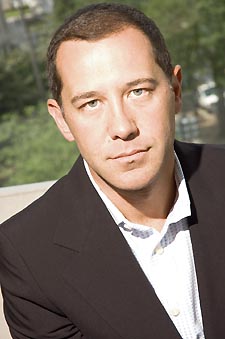 Solmonese |
Solmonese says his biggest goal for HRC is to focus on finding ways to change the anti-gay attitudes and perceptions that too many people still hold.
“How do we change the hearts and minds of people and change their mind-set about us?” he asks. “How do we get people to understand that maybe the equality that we’re seeking is not just important to us but it ought to be important to them?”
In an interview with Metro Weekly, Solmonese talked about his plans to reach that goal, as well as the impact of Microsoft on employment equality, and how important it is to view our victories and setbacks within the context of history.
METRO WEEKLY: Are you still settling in to the office and position?
JOE SOLMONESE: Well, one of the first things I did when I got here was to leave Washington and go out across the country and meet with a diverse cross-section of GLBT Americans. I spent the first two to three weeks doing that.
MW: How did that tour go?
SOLMONESE: It was fascinating because I feel that one of the ways I want to organize our work is around corporate America, communities of faith, and our straight allies — whether it’s in a political campaign or trying to change public opinion, we need to widen the scope of support. I organized this trip to focus on meeting with religious leaders, gay and straight college students, gay and straight families, [as well as] Hallmark’s world headquarters and Ford Motor Company. I was trying to get a sense from people living in the heartland — in Michigan, Texas and Alabama as well as New York, Pennsylvania and California — of their views on where we are in the movement, where we are in the country, where we’re going, what they’re most afraid of, what they’re most hopeful about. Now [I want to] put those experiences to work in terms of thinking about how we are doing here.
MW: Were you meeting with primarily gay and lesbian religious leaders, or was there a broader range including fundamentalists?
SOLMONESE: It wasn’t so much fundamentalists. What we did was reach out in each place to a whole range of religious leaders. Now, as you can imagine, we haven’t heard from very many right-wing fundamentalists except for Fred Phelps, who really didn’t want to talk. But I would say, for instance, in Topeka, we had a rabbi and a Presbyterian minister. We’ve had Catholic priests, a Lutheran, and Metropolitan Community Church and Unitarian ministers. It’s pretty dependent on where we are and what the ecumenical community is like there. In Kansas, for instance, we had people who came to the table with what I would call a neutral sense about the issue — they hadn’t thought a lot about it and came because they were interested in knowing what other religious leaders thought. And those were the people that I really learned a lot from.
MW: Given the nature of the political battles over gay marriage that have been going on in the states, were you surprised that there were people who were neutral or hadn’t given much thought to it?
SOLMONESE: One of the things I’ve learned from working in electoral politics here in Washington for almost 20 years is the degree to which we think people are so completely focused on an issue. When you go out to a state and you actually start talking to people, you realize how relatively little attention is often paid to things that we are so completely consumed by here.
MW: Do you think that sort of insularity undermines some of the efforts that are going on for the GLBT movement outside of Washington?
SOLMONESE: When I think of the whole issue of marriage, I think that in so many of these places these marriage votes were like having the final exam on the first day of class. You had the other side coming out and saying, “Let’s just reinforce marriage and the sanctity of the family — that’s what this is about.” That message was out there every day and in every way, so people didn’t think much beyond that. I think that you have to be mindful of the messages on the other side that are out there and you’ve got to really understand them.
But when you talk about what we think here in Washington, one thing that struck me everywhere I went was how much people spoke to me about their concerns around workplace issues. Whether I was in Kansas or Michigan or Alabama, the whole conversation they had with me was around economic security and workplace issues. Even in the context of marriage, [the issues was] the benefits that they needed to get for their personal livelihood.
MW: One of the biggest recent issues has been Microsoft’s removing its support for the employment nondiscrimination legislation in Washington state. What is the impact of that move on all state efforts to pass non-discrimination acts? And is that something that is going on in a broader corporate level?
SOLMONESE: It’s not something that is going on in a broader corporate level. In fact, I think quite the opposite is going on. If you just look at the trend among Fortune 500 companies, companies are moving to be much more supportive of our community, both inwardly and outwardly. In terms of benefits in the Fortune 500 companies, they are incredibly impressive. I think corporations are also more outwardly supportive of us because it’s the right thing to do and it’s good for business. But Microsoft is chilling because of the questions that linger about the decision that they made.
MW: One of the number of explanations Microsoft gave for pulling their support was sensitivity to their Christian employees. Do you think we’re going to see more of that sort of a co-option of that sensitivity language when talking about anti-gay employees of corporations who may attempt to roll back corporate policies?
SOLMONESE: Here’s the problem. If you follow that logic then their internal corporate philosophy should have changed too. You can’t say that the external corporate philosophy about this issue might be insensitive to a particular group of employees without looking at their internal corporate philosophy, which in their anti-discrimination language says that they don’t discriminate on the basis of sexual orientation. So that defense just doesn’t fly with me.
[What’s happening with Microsoft] is not a threat to ENDA across the board. It’s not indicative of where corporate America is going. It’s not anything like that. But when you talk to Microsoft employees, there’s a real anger at Microsoft and I think there’s also a real sense of heartbreak, because Microsoft is bigger than just an American corporation. Microsoft is like a way of life, it’s an American institution. And it has always been seen as cutting edge and progressive. I think all that makes it much more heartbreaking to people.
[Editor’s note: This interview was conducted shortly before Microsoft announced it would reaffirm its support for Washington state’s non-discrimination legislation.]
MW: Even on issues where we think we have fairly good or growing public support — such as ending “Don’t Ask, Don’t Tell” and for employment discrimination protection — we still don’t see a lot of movement at the federal level. Where does ENDA stand as a legislative goal?
SOLMONESE: I can answer the whole sweeping legislative question — you name the bill and I’ll answer it the same way. In order for us to have any meaningful movement on [the community’s] legislative priorities here, we need to focus on changing the mindset in the states and, short of that, changing seats [in Congress] because we need more supportive members here. So for us to move legislative issues here in a meaningful way, we have to focus as much out there as we do in here.
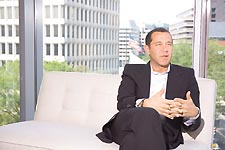 |
MW: Rightly or wrongly, there’s a perception that HRC is heavily involved on the Hill and is the primary lobbying organization in town for the GBLT movement. Does what you’re saying signify a shift in tactics or an expansion in tactics for HRC?
SOLMONESE: I was at EMILY’s List for 11 years when our mission was electing women to the highest political offices. Over the course of a few years, when we were not as successful as we would like to have been, we realized that the work of electing a woman to the United States Senate has to begin long before the 24-month election cycle. So we went about electing women to the state senate or house, or the mayor’s office, or the county commission. We strengthened them by building their political operation so that when a U.S. Senate seat opened up the powers that be in that state said “She’s the one who should go.” So when people asked, “Is that a policy shift? Are you helping women get elected to the state legislature instead of the U.S. Senate?” No. It’s just another way of getting women elected to the U.S. Senate.
We have to go out to the states and change the hearts and minds of people and we have to change the seats when the people on the Hill won’t listen to us. I don’t see one as being mutually exclusive of the other. It’s just an added dimension to the federal work that we’re doing. One of the things that I’ve been saying to other groups and to people in these states is that our priorities sometimes will intersect and sometimes won’t, but we’ll always be very clear with you what our particular goals are. [For example,] I believe that in Pennsylvania all of us will have a really clear goal — to defeat Rick Santorum. Nothing you are ever going to do in the state of Pennsylvania is going to make Santorum say, “Maybe I should alter my stance on this issue.” So we’re going to work together in Pennsylvania to get rid of him.
MW: HRC was very heavily involved in trying to defeat George Bush. Are there any repercussions from that that affect HRC’s ability to get things done given the Republican domination of the federal government?
SOLMONESE: It’s the same repercussion for all progressive groups, which is that George Bush is still in office. The notion that the Bush administration might be more angry at our movement than they were before the election because we worked against him is a little naïve on the part of people. I think it’s naïve to think that if we hadn’t taken on that fight then this administration would be more supportive of our issues.
MW: Does it have any effect on working with more moderate Republicans?
SOLMONESE: It hasn’t been my experience, and I have spoken to more moderate Republicans in the past month than Democrats, quite frankly. I think that they are interested in talking to me and seeing who I am, what I’m all about. But I think that if you are a moderate Republican on Capitol Hill who is supportive of our issues, it would not be a surprise to you that a progressive organization in this town would work to try to defeat George Bush.
MW: Watching the passage of anti-gay constitutional amendments during the last election cycle felt very disastrous. We have a recent victory in Connecticut to look at, but most of our victories seem to be concentrated in the Northeast. How big is the political emergency for the gay and lesbian community right now?
SOLMONESE: I think you have to take a step back and look at where we are in the course of history. I went out Sunday to the Equality Forum (in Philadelphia). Frank Kameny got there to speak and he said, “You people don’t know how lucky you are. Think about where you were 10 years ago and if you’re here now, where are you going to be 10 years from now?” He did a great job of kind of lifting this whole thing up and putting it in the context of the history of our movement and the history of the country.
You have to look at the context of our movement and this particular struggle for the rights and responsibilities that come with marriage — what does that look like compared to what it was like 10 years ago? You couldn’t get married anywhere 10 years ago. For anyone to sort of second guess things and say, “Maybe if we had taken this road we’d be able to get married everywhere now” — that’s silly. You have to look at political reality.
A number of couples went forward in Massachusetts with a lawsuit and said, “We want the same rights and responsibilities that everyone else in the state has.” And they got it. I don’t think they ever in that historic process said, “I don’t know what this is going to do for John Kerry’s poll numbers.” Social change just doesn’t work that way. So that happened in Massachusetts and now a handful of places say, “That’s not going to happen here.” It always happens that way, in every struggle for social change.
MW: You mentioned political reality. Let’s look at Mayor Gavin Newsom’s actions in San Francisco. Massachusetts set off its own powder keg among social conservatives, but then San Francisco really got them worked up because it seemed as if gay marriage rights were being created by fiat. Do you think that Newsom or San Francisco or certain states might hold some responsibility for increasing a level of backlash by making gay marriage rights seem like they were happening much faster than they actually are?
SOLMONESE: I don’t know if you could look at the imagery of people walking out of Cambridge City Hall versus the imagery of people walking out of San Francisco City Hall and make some sort of definitive argument about which prompted more reaction. I think you have to be mindful of the fact that a lot of people may have reacted to that, but the people who worked to put these anti-marriage ballot measures on in the states didn’t need Massachusetts or Gavin Newsom to inspire them to do it. I don’t know if it’s banning gay marriage for the sake of banning gay marriage — it may be banning gay marriage because they don’t want people in their state to focus on the real reason that their families are stressed and their marriages are tense, that it’s more about economic hardships than it is about the social fabric of their states. That’s a pretty clever political tactic — I think history is going to show that that was at work here as much as anything else.
MW: Why are anti-gay politics so effective among certain areas in the country? Does it come down to a basic dislike of GLBT people?
SOLMONESE: I think they are effective because of a lot of broad core organizing principles that work really well and are incredibly difficult to overcome. For instance, any thinking person knows that the stress or the angst or the tension that exists within a family between a husband and wife have not one thing to do with the lesbians who live down the street. But oftentimes we don’t want to take a hard look at what those tensions really are — whether it’s the fear of your economic future, fear of terrorism, fear of sending your kids off to school in the morning. It’s a lot easier for someone to come along and say, “What’s really the cause of this is gay marriage.” Well, how much easier of a fix could there be?
There is a right-wing Christian fundamentalist force that is against gay marriage because they truly believe that it is the breakdown of society. But there are a lot of people out there who are advancing this [anti-gay agenda] because it makes rich people richer and poor people poorer. Because if you buy into the idea that voting against gay marriage is going to strengthen your family, you don’t think a whole lot about the fact “No Child Left Behind” has no money behind it, or that there’s no money in your kids’ school, or that you’re not making enough money to have a stable, secure family. I think both things are at work.
I think that we walk a bit of a tightrope here in that I believe we have to speak to a broader group of Americans. I know that I’ve said some things in the mainstream press that our community has felt that I might have taken a different tack with. But what I’m trying to do is connect with somebody out there who might scratch their head and say, “I’m not really supportive, but that makes me think more.” I understand that members of our community look to me in particular to speak to them but I think you try to do both to the degree that I can.
MW: So, why are so many people from Massachusetts running the gay and lesbian movement?
SOLMONESE: Tim McFeely’s letter to the editor in the Washington Blade following up on their “Massachusetts Mafia” story had a very good point — and this is his point, not mine: Massachusetts is a place where a lot of people go to school and that draws a lot of people to a progressive, activist environment. It may be that that is where more people in this kind of work come out of. Let’s see, there’s me, there’s [former HRC head] Cheryl [Jacques], [Log Cabin Republicans executive director Patrick [Guerrierro].
MW: I’m from Kentucky, and you never see anyone from Kentucky in charge. It’s interesting, because if you look at Los Angeles you have the so-called “Velvet Mafia” as well. There’s almost always a kernel of truth to these things. Do we have our own good-ole’-boy and good-ole’-girl clubs running the gay and lesbian movement?
SOLMONESE: No, I don’t think so. I think it goes back to there may be a core group of people who went to school in Massachusetts and have Massachusetts ties. But if you really go back and look at all of us out there running GLBT organizations and all of our predecessors, maybe there are a half dozen people from Massachusetts who are right now a little bit more high profile. But when you weigh in the fact that a lot more activists probably went to school in Boston than went to school in Louisville, you know, you begin to see that maybe it’s more of a fun idea to advance than anything else.
Support Metro Weekly’s Journalism
These are challenging times for news organizations. And yet it’s crucial we stay active and provide vital resources and information to both our local readers and the world. So won’t you please take a moment and consider supporting Metro Weekly with a membership? For as little as $5 a month, you can help ensure Metro Weekly magazine and MetroWeekly.com remain free, viable resources as we provide the best, most diverse, culturally-resonant LGBTQ coverage in both the D.C. region and around the world. Memberships come with exclusive perks and discounts, your own personal digital delivery of each week’s magazine (and an archive), access to our Member's Lounge when it launches this fall, and exclusive members-only items like Metro Weekly Membership Mugs and Tote Bags! Check out all our membership levels here and please join us today!
















